SOCIAL ECONOMY INSIDER
Unlocking the Power and Po

ISSUE 02 APRIL 2024 YOUR SOCIAL ECONOMY MAGAZINE
Disclaimer
The information and opinions expressed in this magazine are solely those of the authors and do not necessarily represent the views or endorsement of the publication, its editors nor the European Commission. All content, including articles, reports, media and images, is provided for informational purposes only. Readers are encouraged to verify any information and consult with the mentioned authors, where applicable, before making decisions based on the content of this magazine.
This magazine is a product of the baSE project, co-funded by the European Commission. For more information about the baSE project, please visit www.socialeconomyskills.eu The collection of materials for this magazine has been led by Diesis Network, with Giulia Georg and Aurora Passarini serving as the main editors and providing support in gathering materials and content from all the baSE partnership organisations.
For inquiries, please contact: Social Economy Insider www.socialeconomyskills.eu https://www.linkedin.com/showcase/base-project/ baseproject4skills@gmail.com
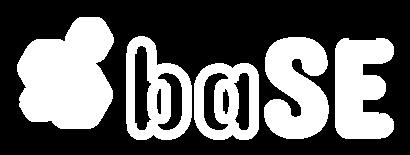
Image and Template
Disclaimer:
The images in this magazine are from the websites of the authors and organisations mentioned. Credits and links to the original sources are always present in the images. In addition, some images come from Pexels (www.pexels.com) and are used in accordance with the Creative Commons Zero (CC0) licence, which allows for free use of these images for personal and commercial purposes, with no attribution required. While we've thoughtfully selected these images to enhance our content, their inclusion doesn't imply any endorsement or association with the magazine authors.
The draft template for this magazine was crafted using Canva (www.canva.com). We're grateful for the user-friendly design tools provided by Canva, which facilitated the creation of the initial layout.
If you believe that your copyrighted work has been used improperly, please contact us, and we will address the matter promptly. Thank you for your understanding and for enjoying our meticulously curated visual content, supported by Pexels and the initial template assistance from Canva.
Welcome
Welcome to our magazine, your ultimate guide to staying abreast of the latest trends in the social economy sphere. In this edition, we bring you insights into new projects and partnerships, fundraising opportunities, the latest developments in the Large-scale Skills Partnership, opportunities surrounding the upcoming EU elections, and an original article exploring the imperative need for standards in the social economy, with a special focus on Slovenia. Additionally, discover exemplary practices and innovative models navigating the challenges of the twin transition, and much more!
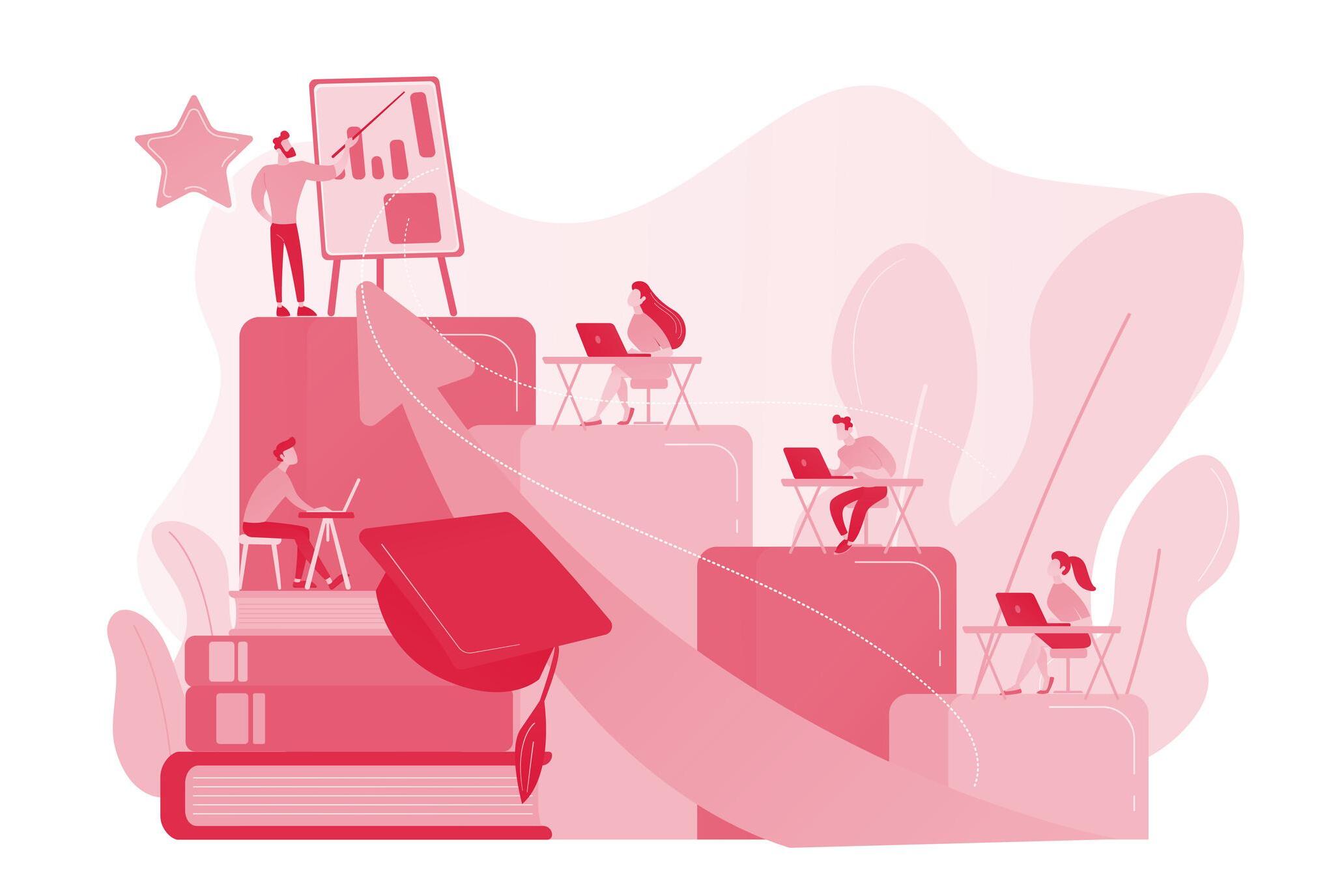
We are thrilled to present to you the second edition of Social Economy Insider, a ground-breaking magazine dedicated to unravelling the social economy trends.
Independent and Autonomous
Social Economy Insider emerged from the writing of the baSE project, but it aims to transcend the boundaries of the project and become an independent and sustainable entity that unites different actors in the social economy sector.
Journey with Us
Whether you're a seasoned practitioner or simply intrigued by the notion of a more equitable economic landscape, our content is designed to inform, inspire, and ignite conversations that matter.
We would like to invite you all to contribute to the SE magazine by sharing your thoughts and insights on the latest trends and developments in the field. Your contributions can take the form of articles, case studies, interviews, podcasts or any other format that you feel would be engaging and informative for our readers.
Let's engage in a dialogue that sparks innovation, fosters collaboration, and drives change.
Picture: Pexels (Source: https://www.pexels.com/)
SE at a glance

Contents Latest updates Policy insights: EU elections Best of SE: Winners of the 2nd EU Social Economy Awards Did you know? New projects In the Spotlight: Large-scale Skills Partnership (LSP) 10 11 12 Section 1 Your Essentials Meet the practitioners 14
Picture: Pexels (Source: https://www.pexels.com/) Twin transition Research: Civil Perspective of Social Impact 10 Interview: Jone Nolte - LABORPAR Article: Advancing standards for Social Economy development in Slovenia SE Resources Events What’s next? 19 05 06 07 08 18 16 Fundraising opportunities
Policy insights
The European Parliament 2024 elections will be held 6-9 June This is a unique opportunity to push forward the development of the Social Economy in Europe and to maintain the momentum that the Social Economy is experiencing not only at EU level but also at global level.
The most important recent milestones in the EU political agenda for the Social Economy are: Social Economy Action Plan (2021), Transition Pathway for the proximity and social economy ecosystem (2022), Council Recommendation on developing social economy framework conditions (2023).
These achievements are just the start of a process for a fairer and more sustainable EU, therefore the upcoming EU elections are pivotal to making sure all these efforts and objectives stay high on the EU agenda.
Social Economy Europe has published a Memorandum for the European Elections 2024 elaborated with the contributions of all its members.
It encourages the EU institutions to continue their efforts by taking onboard three main proposals in the frame of the European elections 2024 to support the flourishing of social economy all over Europe:
Renewal of the European Parliament’s Social Economy Intergroup 1.
Appointment of a European Commissioner responsible for SE 2.
Continue and further develop the Social Economy Action Plan 3.
Social economy is playing a key role in providing fair and sustainable solutions to the challenges that the EU is facing. SE is known for its contribution to societal challenges and for its capacity to reinforce social cohesion, in addition to nearly 3 million enterprises and organizations which employ more than 14 million people and account for 8% of the EU’s GDP.
The Best of SE
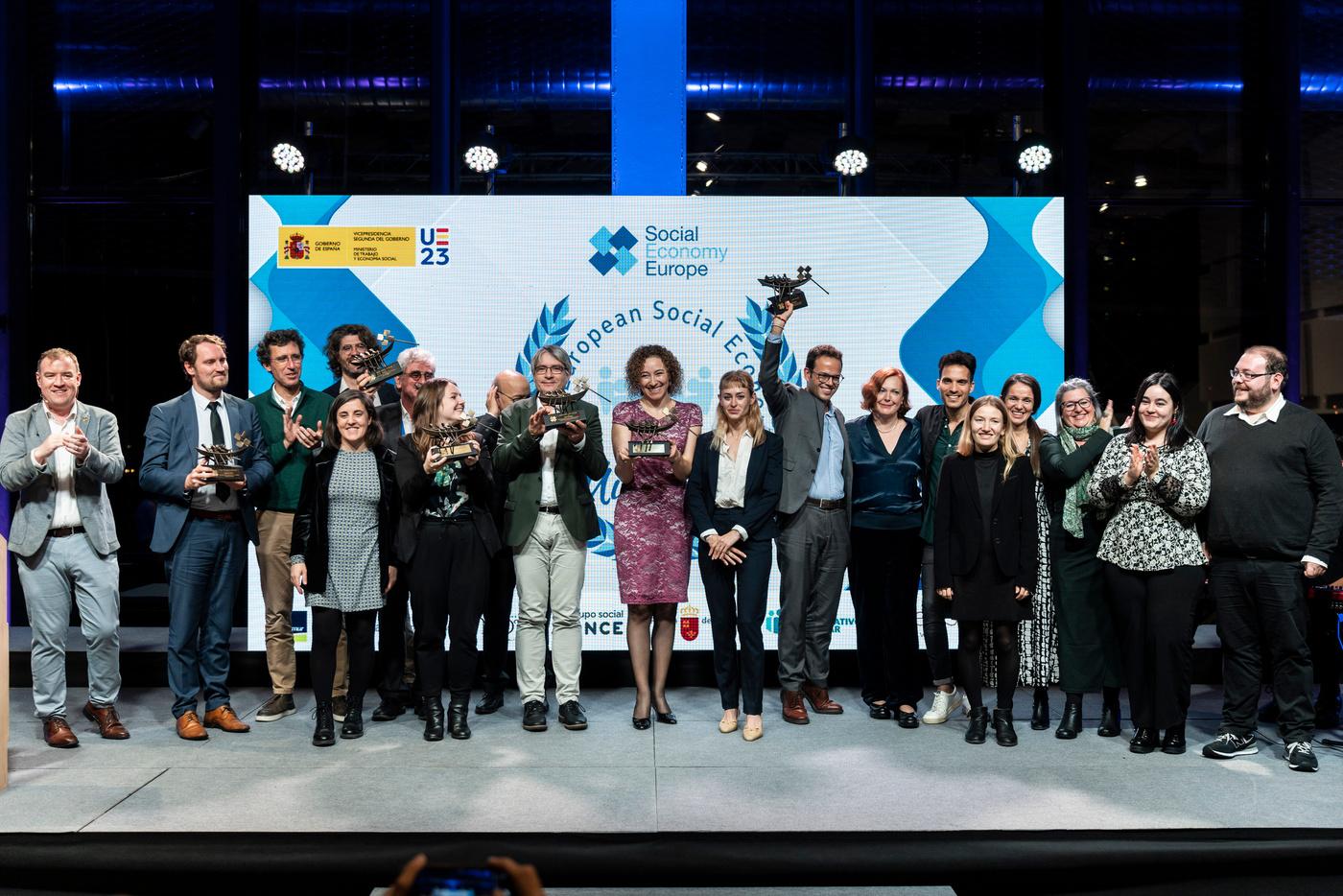
Second
Edition
of the European Social Economy Awards
The ceremony of the European Social Economy Awards was held during the 2023 Social Economy conference in San Sebastian, Spain. The jury has evaluated and awarded prizes to social economy organisations in the following categories: skills, social innovation, green transition, and digitalization.
Vienna Hobby Lobby implements several projects providing original solutions for the social and economic inclusion of vulnerable or marginalised people.

Panacea Cooperative Research S. Coop

focus its activities on technological innovation in the target areas of the Transition Roadmap.


ONCE Fundatiòn delivers a Digital Talent programme, improving the social economy employees’ skills with their training courses.
Energie Solidaire
engages in the Transition Pathways with collective and innovative solutions.
Picture: owned by Social Economy Europe (https://www.socialeconomy.eu.org)
Awards (Source:
)
Pictures: Social Economy Europe
https://www.socialeconomy.eu.org/2023/03/31/european-social-economy-awards-2023//
Picture: owned by Social Economy Europe
Did you know SETS project

The SETS project (Social Economy Transition Skills) aims to develop, test and disseminate programmes and training modules on suitable skills development to foster the Green and Digital transition of Social Economy Organisations (SEOs). This 2-year project officially started in January 2024.
SETS partnership covers: France, Slovenia, Italy and Belgium.
With 6 pilot trainings courses on reskilling and up-skilling in France and Slovenia.
SETS activities and actions will have a significant impact at a pan-European level, promoting future scalability and replicability of its outcomes through other funds, mainly Cohesion Funds
ESIC project

The European Social Innovation Campus (ESIC) project, under the Erasmus+ Blueprint Alliance program, contributes to the challenge of the upskilling and reskilling of 5% of the workforce and entrepreneurs in the social economy sector each year to tackle the green and digital transitions by boosting social innovation capacities. This four-year partnership officially started in September 2023.
The ESIC Alliance will work together to develop strategic approaches to facilitate the co-creation, scaling-up and replication of social innovations. The partnership brings together 15 partners from 10 EU countries: Spain, Romania, Ukraine, Netherlands, Italy, Finland, Belgium, Ireland, Estonia and Norway.
In the Spotlight
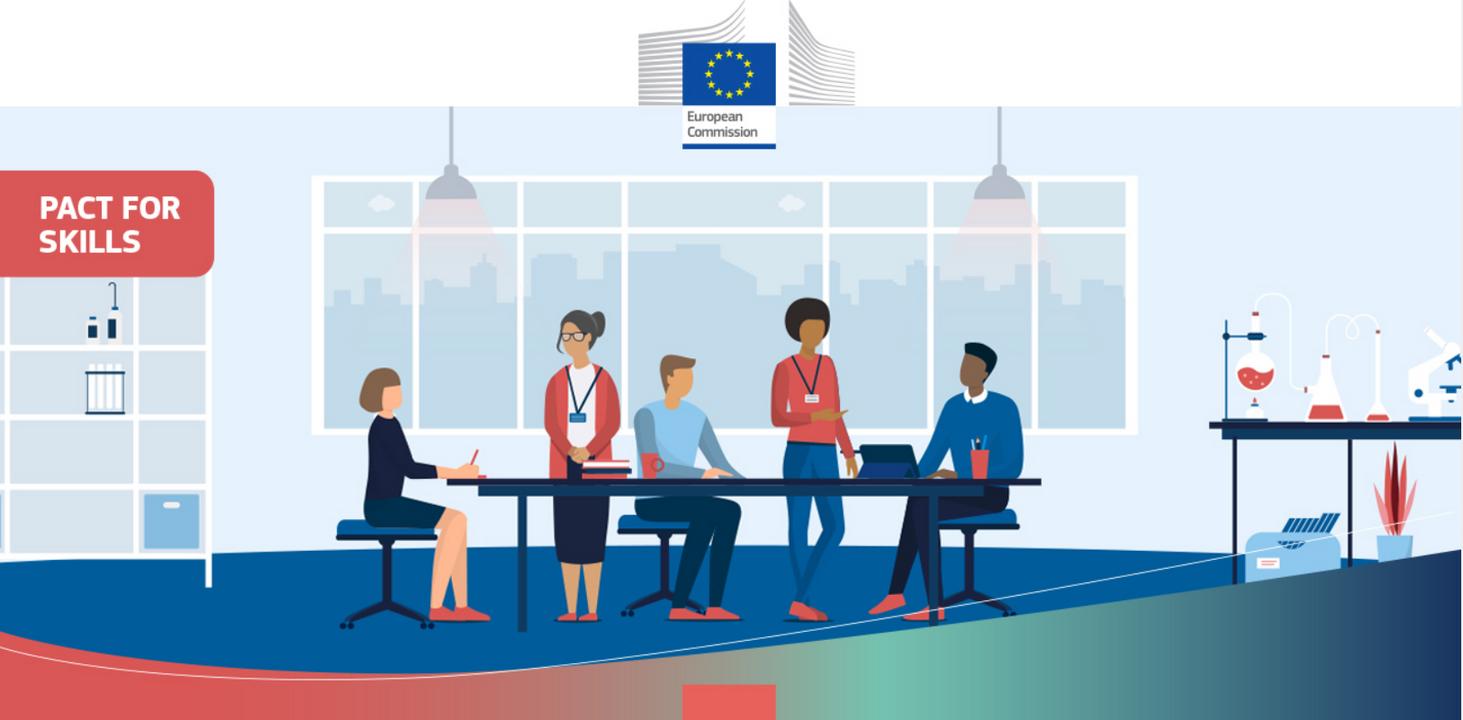
Large-scale Skills Partnership
Social Economy Europe and Euricse are coordinating the Largescale Skills Partnership (LSP) for the Proximity and Social Economy ecosystem in the frame of the Pact for Skills initiative.
The Pact for Skills aim is to increase upskilling and reskilling of the labour force both in the frame of the EU Pilar of Social Rights and the EU Industrial Strategy.
Each of the 14 EU industrial ecosystems has its own LSP in order to provide the workforce with the skills needed for the twin transition. The partnership for the Proximity and Social Economy ecosystem aims at gathering information on the state of the art of the ecosystem regarding the upskilling and reskilling of employees and entrepreneurs, while identifying key areas and needs.
Picture: Pact for Skills (Source: www.social-economy-gateway.ec.europa.eu/)
The LSP will promote:
accessibility and information sharing among LSP members, regarding financial and non-financial resources for skills development activities.
1. Strengthen the partnership
This month, the LSP renewed its initial commitment (May 2022), in a participatory process that included workshops and a survey among the LSP Members.
This process enhanced the initial commitment with five updated pillars and goals:
2. Map the state of the art of skills of the LSP
3. Improve skills intelligence for the ecosystem
4. Knowledge sharing
5. Support partners to develop upand reskilling activities
The first Pact for Skills Forum took place on 21-22 March 2024 inBrussels,with livestreamed sessions online. It provide an overview of the Pact’s achievements to date and outline its vision for future development.
Take a look at their website if you missed the event and for new updates.
New members welcomed
The partnership welcomes new members of the Pact for Skills interested in the Proximity and Social economy who share the Partnership’s goals and want to contribute to the impact of the ecosystem.
Currently, the LSP counts on almost 200 members including SE enterprises and organizations, education and training institutions, local and regional authorities and clusters.
Registrations
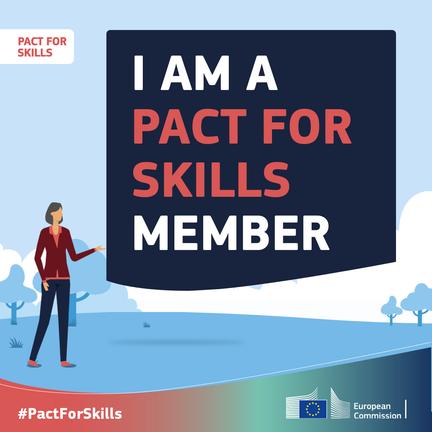
“The Civil Perspective of Social Impact”
This paper aims to contribute to the transition from merely measuring and evaluating impact to effectively managing and governing it (impact management & governance)
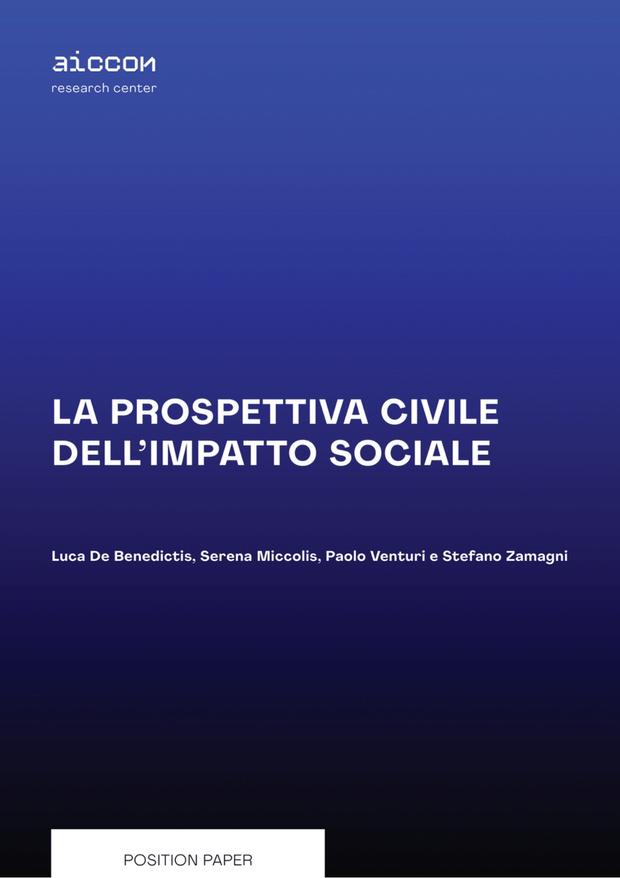
Research by:
De Benedictis Luca
Miccolis Serena
Venturi Paolo
Zamagni Stefano
This research emphasizes the importance of promoting genuine capacity-building processes for and with local stakeholders, by employing social impact evaluation tools. Social impact evaluation aims to raise awareness and articulate the positive and negative transformations resulting from these activities within their respective contexts.
Here, the focus is, instead of offering prepackaged solutions, to co-create tools and solutions tailored to the specific needs of the community.
The objective is to clarify the differences in reporting practices, particularly between measuring activity realization and evaluating social impact.
it here Research
Read
Picture: owned by AICCON (https://www.aiccon.it/)
Jone Nolte Interview
President of LABORPAR, the federation of business associations of worker-owned companies and manager of ASLE, the Basque Association of Worker Owned Companies
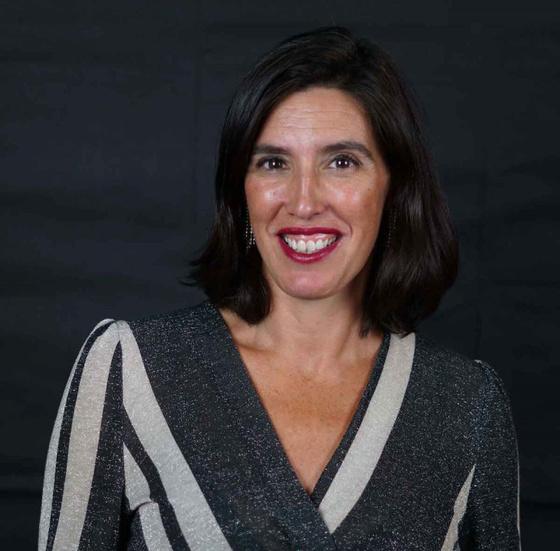
“Starting a business is not easy, especially at the beginning. But shared success is very sweet.”
The vocation of LABORPAR is the social transformation, where the workers are the owner as well, and the business is developed in collaborative way. Therefore, those projects are focused on people, who contribute to the results of the organization being very important feeling part of it.
However, this worker-owned companies, which are multisectoral, are competitive enterprises as well, competing in the same conditions as the others, but with an important vocation of transforming the society.
This social commitment makes the difference among all other companies.
In Spain there are 6.500 worker-owned companies. Moreover, the social economy presence in media is increasing, due to the fact that is part of a Spanish ministry, the Ministry of Labour and Social Economy.
In this interview, Jone Nolte talks about the sustainable and resilient business models within the Social Economy and highlights its added value both internally (for workers) and externally (for the society). Jone Nolte highlights the resilience and the centrality of people in this model and encourages entrepreneurs to make the leap to the Social Economy.
Interview by LABORPAR

“ADVANCING STANDARDS FOR SOCIAL ECONOMY DEVELOPMENT IN SLOVENIA: CURRENT LANDSCAPE AND FUTURE DIRECTIONS”
Written by; Babič, Karolina & Letonja, Marina (2024). DOBA Business School Maribor, Slovenia.
In late January 2024, DOBA Business School convened a hybrid round table gathering esteemed stakeholders to deliberate on the imperative need for standards within Slovenia's burgeoning social economy sector. Representatives from diverse backgrounds including academia (University of Ljubljana, DOBA Business School), governmental bodies (Ministry of economy, tourism and sport), non-governmental support organizations for social economy (Središče Rotunda, so.p., Združenje CAAP, so.p.), and vocational education institutes converged to dissect the existing standards landscape and chart a course towards comprehensive development.
SLOVENIAN HISTORY OF COOPERATIVISM
Regarding the current standards framework we can say that Slovenia boasts a rich history of cooperativism and civil society engagement, yet the current regulatory framework, while robust in formality, falls short in encapsulating quality standards requisite for the optimal functioning of social economy organizations (SEOs). The existing legal framework comprises the Law on Cooperatives and the Social Entrepreneurship Act, which delineate the formal parameters for SEOs. However, these provisions primarily govern organizational structure and purpose of SEOs, leaving a void in quality assurance standards.
GAP IN QUALITY ASSURANCE STANDARDS
Efforts to bridge this gap are underway, with the impending Regulation on social impact measurement poised to address some aspects of quality standards, and for which the professional recommendations were already developed.
Additionally, regulatory mechanisms governing the support ecosystem for social economy endeavours, exemplified by the criteria for NGOs to attain special status (status of a non-governmental organization in the public interest in the field of social entrepreneurship development) which is awarded by Ministry of economy, tourism and sport, contribute to the broader framework. Nevertheless, it is evident that a more holistic approach is necessary to encompass the multifaceted dimensions of quality within the social economy realm.
At the heart of advancing quality standards lies the recognition of education and training as essential drivers.
Article
EDUCATIONAL LANDSCAPE IN SLOVENIA
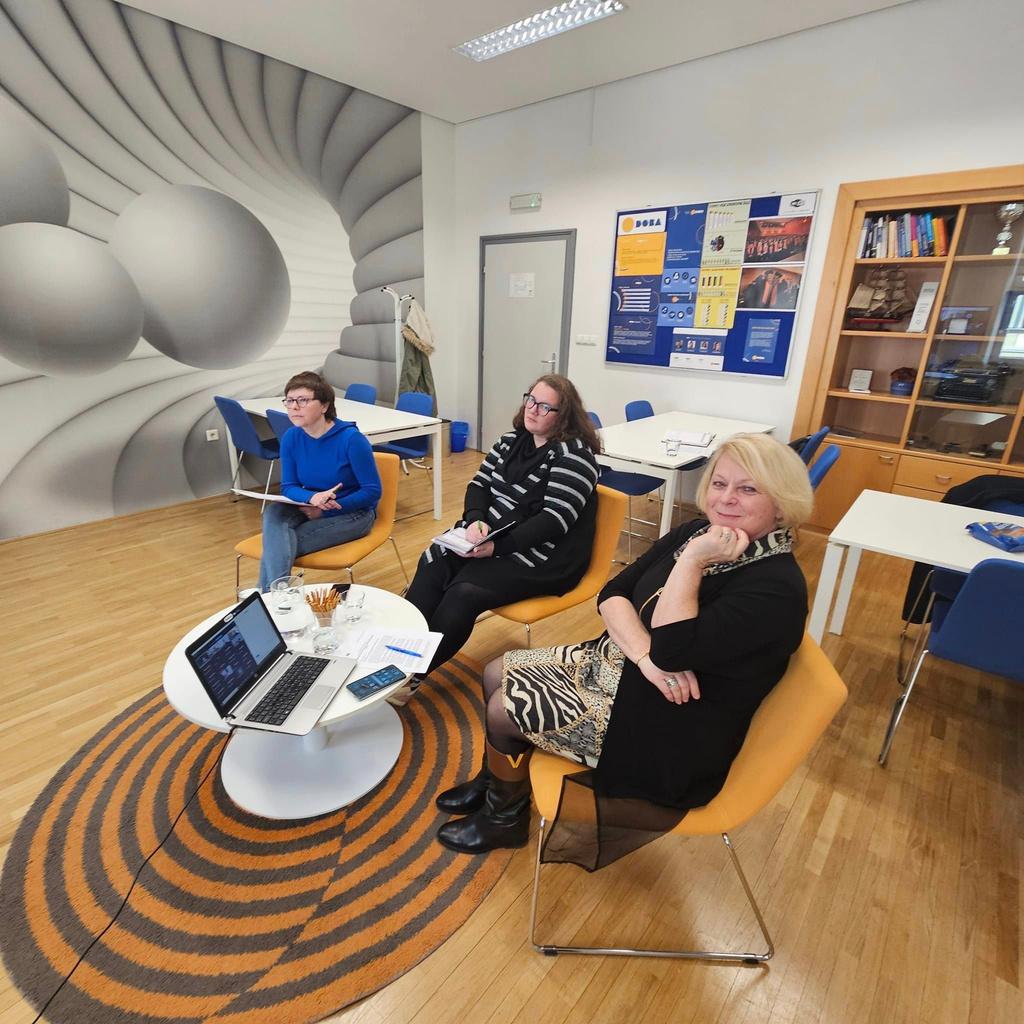
Presently, fragmented, characterised intermittent training fragmentation, round to enhancing quality establishing for curriculum design, encompassing both formal and informal educational channels.
Acknowledging the need for centralised guidance, there is a call to establish a commission or expert group tasked with steering the development of educational standards tailored to Slovenia's social economy sector. This initiative aims to provide a cohesive framework guiding the creation of new programs, courses, microcredentialing avenues, lifelong training initiatives, and informal educational offerings, all underpinned by rigorous professional standards.
Furthermore, discussions prompted reflections on the scope of such educational endeavours, questioning the necessity of comprehensive study programs versus a more agile micro-credentials approach suitable for Slovenia's socio-economic context. Another pertinent consideration highlighted the potential pitfalls of overstandardization, emphasizing the delicate balance required to prevent excessive regulation from stifling the organic growth of the social economy sector. This cautionary note was underscored by examples such as the challenges encountered in implementing a vocational education and training program designed for the role of an Expert Associate in social economy, where narrow entrance conditions inadvertently hindered program adoption due to insufficient participation.
IMPERATIVE NEED FOR QUALITY STANDARDS
In summation, the round table underscored the imperative for quality standards to complement existing legal frameworks governing Slovenia's social economy. Foremost among the identified strategies was the elevation of education and training standards as catalysts for sectoral advancement. As Slovenia embarks on this trajectory, navigating the delicate balance between standardization and innovation will be paramount in fostering a vibrant and inclusive social economy ecosystem.
Picture: owned by DOBA Business School (https://www.dobabusiness-school.eu/)
Resources Corner
YOUR ESSENTIALS
Training: DigiProject / DigitalESS
DigitalESS 01
DigiProject is an interactive program that helps enterprises in the management of digital-based project. A personalized guide, step-bystep support, tools and methodologies are available within the training, which is free and open to all.
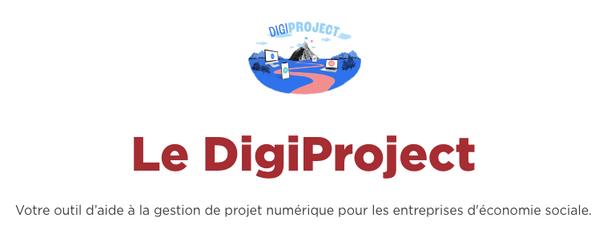
Podcast: : Sustainability within non-profits
Carmichael 02
Carmichael is a charity that guides non-profit and supports them in Ireland. The episode invited Niall Fitzgerald, who spoke about sustainability in non-profit sector. The discussion involved standards for the reporting framework on sustainability for non-profit enterprises.
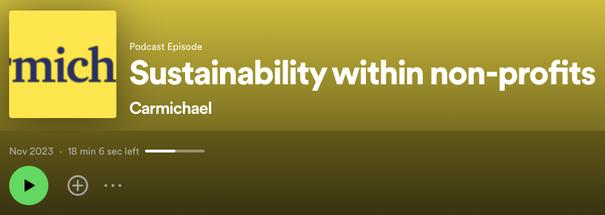
Platform Cooperativism: digital democracy and enhanced mutualism
AICCON, Italy
Trebor Scholz, director of the Institute for the Cooperative Digital Economy and founder of the Platform Cooperativism Consortium, talks about how the platform coop movement constitutes a great opportunity to relaunch new, more inclusive and democratic institutions. Digital can only become the medium for a new generation of platforms if it is able to promote exchanges and conversations capable of increasing the power of citizens and communities.
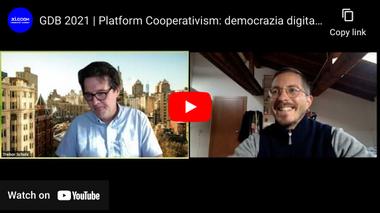
The Digital Collective (DigiCo) is a non-profit organisation advocating for the digital inclusion of marginalised communities across Europe. Skillify is their landmark skills assessment tool that helps individuals understand their level of digital skills and trainers improve their training programs. It provides a detailed report on their digital skills and personalised training recommendations to continue their learning journey.

tool: Skillify 2.0 An Inclusive Digital Skills Assessment
Training
04 03
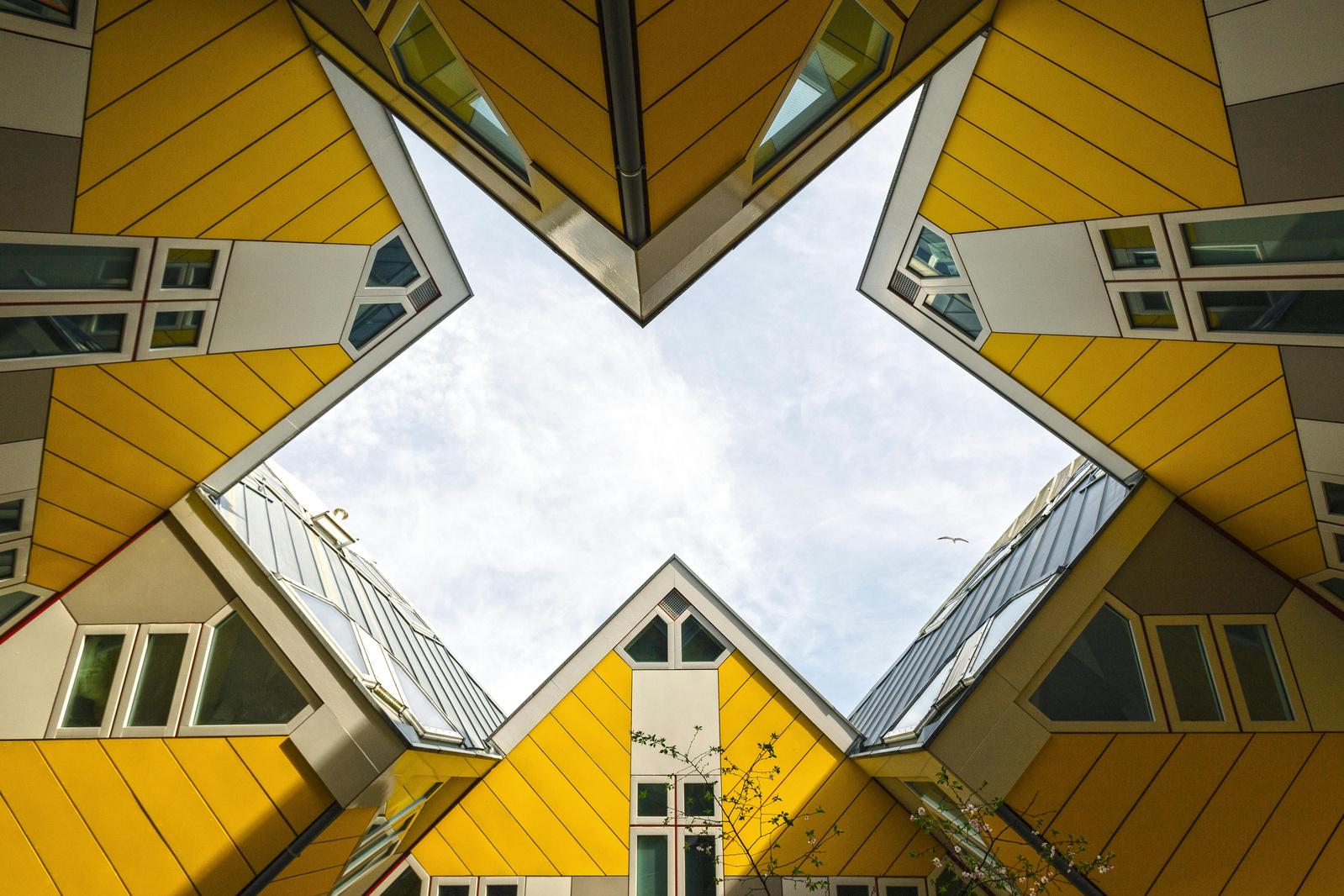
MEET THE PRACTITIONERS
We introduce you to a captivating section showcasing the remarkable endeavours of social economy practitioners across Europe
We delve into the inspiring stories and innovative practices that are reshaping our societies for the better
Join us as we uncover the transformative power of social economy initiatives, highlighting the individuals and organizations that are making a profound impact on their communities
Picture: Pexels (Source: https://www.pexels.com/)
01
Plastich Whale Netherlands
Plastic Whale is the pioneering plastic fishing enterprise globally, dedicated to eradicating plastic pollution from waterways while extracting value from plastic waste. They have already retrieved 26,758 bottles and 7,113 plastic bags.
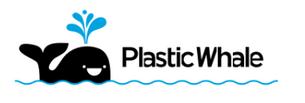
Founded in Amsterdam, Plastic Whale embarked on a unique challenge: constructing a boat entirely from plastic waste. These boats are actively deployed for plastic fishing expeditions in both the Amsterdam canals and the Rotterdam port.
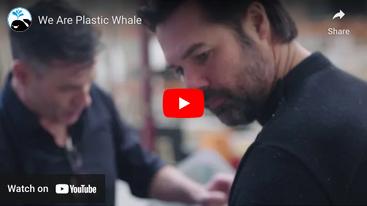
02
Solar-Bürger-Genossenschaft eG Germany
The Solar Citizens' Cooperative is an independent energy cooperative founded by citizens and based in Freiburg. They would like to advance the democratization of the energy industry and the development towards a sustainable, decentralised and fair energy supply with citizen participation.
I believe it is important to address skills gaps in companies and organizations in the social economy in order to make companies in the sector, especially cooperatives, fit for the future In order to achieve this, I support those in Germany in establishing contacts with energy cooperatives. I am well connected in this social economy sector because I myself am a member of the board of the Solar-Bürger-Genossenschaft eG based in Freiburg This was founded in 2005 and is the oldest active photovoltaic generation cooperative in Germany Also, I am currently planning a thematic focus on the digitalization of cooperatives in Germany in the magazine CONTRASTE with a special focus on digital member participation ”
Burghard Flieger, Board Member and Scientific Director of innova eG
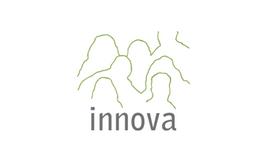
Fundraising opportunities

The EU Social Economy gateway has a reserved section for EU funding programmes for social economy, including a European Funding toolkit and a guidance to use the Funding & Tenders portal.
EU Funding Toolkit
Social Innovation Funding Toolkit Guide to EU funding
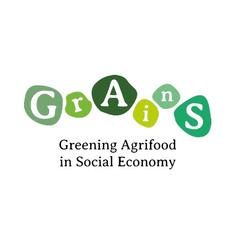
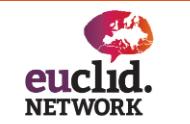
The GRAINS Financial Facility Program will select up to 60 Social Economy SMEs to receive financial support for greening projects in their agrifood businesses in EU Member States and Ukraine.

Euclid Network developed a page with an Overview of the EU Calls For Proposals, including detailed information on each call and its deadline

Project funded by the EC which aims to increase the use of ESF+ (European Social Fund Plus) and ERDF (the European Regional Development Fund) funding by social services and to make it easier to access these funds

Here is where you’ll find all open EU funds that are most suitable for Irish civil society
Picture: AFIN website (https://www.afin.org.ro/misiune-viziune-valori/?lang=en)
What’s next?
NEB Festival
International New European Banhaus Festival
9 - 13 April 2024
Brussels, Belgium

All Digital Weeks
“Enhance your digital skills”, ALL DIGITAL Weeks 2024
13-31 May 2024
Brussels, Belgium / online
Enterprising for Tomorrow
Romania's Flagship Social Economy Conference for Learning, Connecting, and Collaborating
17 April 2024
Iaşi, Romania
Picture: Canva (Source: www.canva.com/)
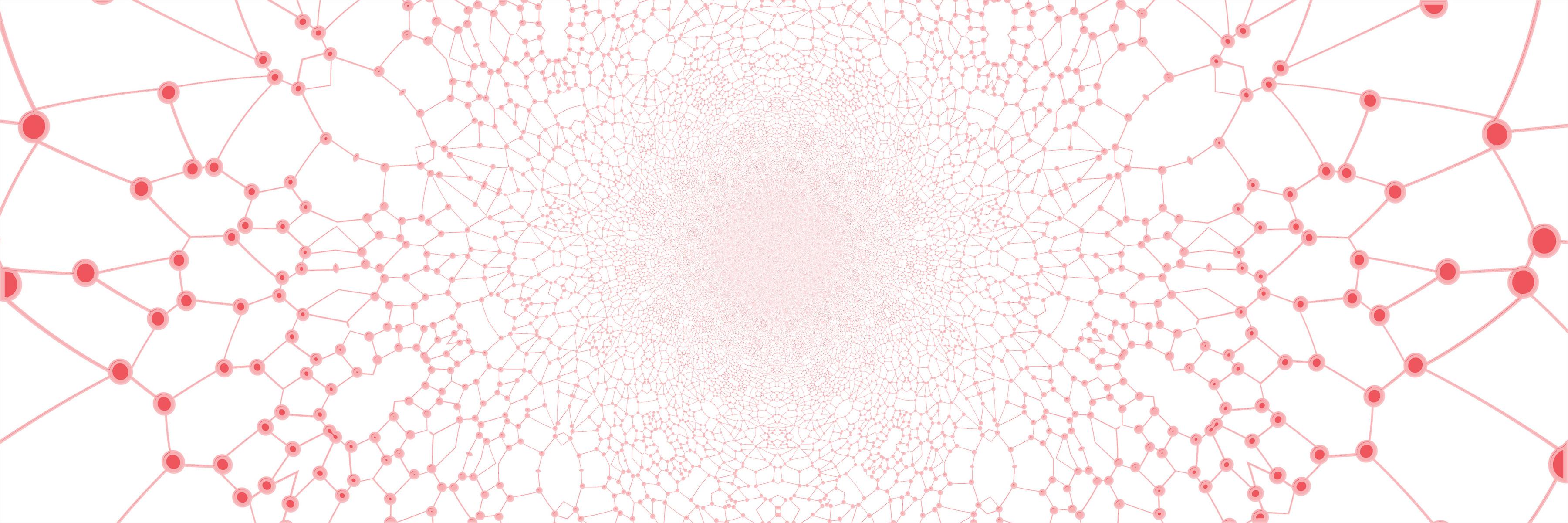
SOCIAL ECONOMY INSIDER
Unlocking SE's Global Power and Potential

www.socialeconomyskills.eu
baseproject4skills@gmail.com
Picture: Pexels (Source: https://www.pexels.com/)































